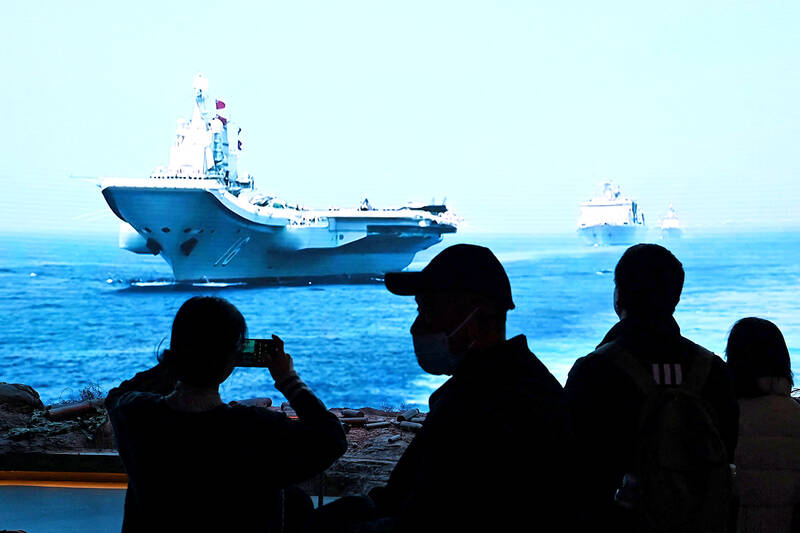A Chinese aircraft carrier group yesterday sailed through the Taiwan Strait, Minister of National Defense Wellington Koo (顧立雄) said, a day after China held a live-fire exercise near Taiwan.
“The Liaoning is passing through the Taiwan Strait now, sailing north along the west of the median line and we are closely monitoring it,” Koo told reporters at the Legislative Yuan in Taipei.
The Liaoning also took part in China’s large-scale military drills around Taiwan on Monday last week.

Photo: AFP
Taiwan said at the time that the Liaoning operated off the nation’s southeast coast during those drills, launching aircraft off its deck.
It appeared to be returning to Qingdao port in eastern China via the Pratas Islands (Dongsha Island, 東沙島), in the northern part of the South China Sea, for “replenishing and necessary maintenance,” said Jiang Hsin-biao (江炘杓), a retired navy captain at the Taipei-based Institute for National Defense and Security Research think tank.
Its involvement in the recent military drills was for “the purpose of practising against foreign forces and intimidating Taiwan,” Jiang said.
In Beijing, China said that it was “perfectly normal” for its aircraft carriers to sail near Taiwan.
“Taiwan is Chinese territory. It is perfectly normal for Chinese aircraft carriers to sail in its own territory and territorial waters,” Chinese Ministry of Foreign Affairs spokesman Lin Jian (林劍) told a regular briefing.
China has two aircraft carriers in service, and a third undergoing sea trials. The Liaoning has previously passed through the Strait.
Japan last month said the same carrier had entered Japan’s contiguous waters for the first time.
China has sailed its carriers through the strategic strait before, including in December shortly before Taiwan held elections.
China says it alone has jurisdiction over the nearly 180km-wide waterway that is a major passageway for international trade. Taiwan and the US dispute that, saying the Taiwan Strait is an international waterway.
The US Navy regularly sails through the Strait to assert freedom of navigation rights. Other allied states, such as Canada, Germany and Britain, have also carried out similar missions, to the anger of Beijing.
In related news, Japan and the US yesterday commenced 10 days of joint military drills involving tens of thousands of personnel.
The joint military drills “Keen Sword” would involve 45,000 Japanese and US troops, 40 vessels and 370 aircraft, as well as some forces from Australia and Canada, the Japanese Joint Staff said.
The exercises, which take place every two years, are being held across Japan, including at Japanese and US military bases, through Friday next week.
“We have a strong sense of urgency that we can’t rule out the possibility of a serious situation resembling Ukraine happening in regions near our country,” General Yoshihide Yoshida, the top uniformed officer in Japan’s Self-Defense Forces, said on Tuesday.
“We are determined to prevent and deter such a situation,” he told a news conference, adding that the US-Japan alliance was integral to regional stability.
“Keen Sword will ensure we maintain our advantage over those who seek to undermine the rule-based international order,” Admiral Steve Koehler, commander of the US Pacific Fleet, told reporters on Tuesday.

Beijing could eventually see a full amphibious invasion of Taiwan as the only "prudent" way to bring about unification, the US Department of Defense said in a newly released annual report to Congress. The Pentagon's "Annual Report to Congress: Military and Security Developments Involving the People's Republic of China 2025," was in many ways similar to last year’s report but reorganized the analysis of the options China has to take over Taiwan. Generally, according to the report, Chinese leaders view the People's Liberation Army's (PLA) capabilities for a Taiwan campaign as improving, but they remain uncertain about its readiness to successfully seize

Taiwan is getting a day off on Christmas for the first time in 25 years. The change comes after opposition parties passed a law earlier this year to add or restore five public holidays, including Constitution Day, which falls on today, Dec. 25. The day marks the 1947 adoption of the constitution of the Republic of China, as the government in Taipei is formally known. Back then the Chinese Nationalist Party (KMT) governed China from Nanjing. When the KMT, now an opposition party in Taiwan, passed the legislation on holidays, it said that they would help “commemorate the history of national development.” That

Trips for more than 100,000 international and domestic air travelers could be disrupted as China launches a military exercise around Taiwan today, Taiwan’s Civil Aviation Administration (CAA) said yesterday. The exercise could affect nearly 900 flights scheduled to enter the Taipei Flight Information Region (FIR) during the exercise window, it added. A notice issued by the Chinese Civil Aviation Administration showed there would be seven temporary zones around the Taiwan Strait which would be used for live-fire exercises, lasting from 8am to 6pm today. All aircraft are prohibited from entering during exercise, it says. Taipei FIR has 14 international air routes and

Snow fell on Yushan (Jade Mountain, 玉山) yesterday morning as a continental cold air mass sent temperatures below freezing on Taiwan’s tallest peak, the Central Weather Administration (CWA) said. Snowflakes were seen on Yushan’s north peak from 6:28am to 6:38am, but they did not fully cover the ground and no accumulation was recorded, the CWA said. As of 7:42am, the lowest temperature recorded across Taiwan was minus-5.5°C at Yushan’s Fengkou observatory and minus-4.7°C at the Yushan observatory, CWA data showed. On Hehuanshan (合歡山) in Nantou County, a low of 1.3°C was recorded at 6:39pm, when ice pellets fell at Songsyue Lodge (松雪樓), a